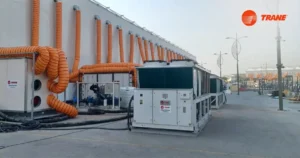Iraq’s economy is entering a new phase of growth, with industrial activity, agriculture, and trade networks expanding at a rapid pace. To keep up with these demands, businesses must rely on reliable, climate-controlled infrastructure to protect sensitive goods. For many industries, the adoption of refrigerated containers has become a game-changer. These mobile, temperature-controlled units provide flexible solutions that safeguard food, pharmaceuticals, and industrial supplies, ensuring that products maintain their integrity from production to consumption.
Iraq’s Unique Climate and Supply Chain Challenges
Summers in Iraq can be unforgiving, with temperatures often exceeding 45°C. Such extremes put tremendous strain on supply chains, especially those handling perishable goods or sensitive materials. Without proper climate control, food can spoil before it reaches markets, medical supplies can lose effectiveness, and industrial components can become damaged. For companies operating in Iraq’s growing logistics and agricultural sectors, the challenge lies not just in transporting products but in ensuring they arrive in usable condition despite the harsh climate.
Why Refrigerated Containers Matter
The adoption of refrigerated containers provides an answer to these pressing challenges. Unlike traditional storage, these units are designed for portability and precision, offering reliable temperature control across long distances. They can be deployed quickly at ports, warehouses, farms, or distribution hubs, enabling businesses to bridge gaps in cold chain infrastructure. Their flexibility allows companies to expand into new markets without heavy investments in permanent storage facilities, giving them both operational efficiency and financial agility.
Benefits for Iraq’s Agricultural Sector
Agriculture remains one of Iraq’s most critical industries, feeding local populations and supporting exports. Yet farmers often face losses due to spoilage during transport or delays in distribution. Refrigerated storage addresses this gap by keeping crops, fruits, vegetables, and meat products fresh throughout the journey from farm to market. With reliable systems in place, agricultural producers can improve profitability, reduce waste, and build stronger ties with retailers and international buyers who demand consistency in quality.
Applications in Healthcare and Pharmaceuticals
The healthcare sector is another key area where temperature-sensitive logistics are vital. Vaccines, medicines, and diagnostic samples all require precise conditions to remain effective. In a country where infrastructure can be strained, portable climate-controlled solutions offer a safeguard for medical supply chains. With access to mobile cold storage, hospitals, clinics, and distributors can ensure that life-saving products reach patients in optimal condition, even in regions affected by power shortages or transportation bottlenecks.
Supporting Iraq’s Trade and Logistics Growth
Iraq’s strategic location as a trade hub makes logistics a critical pillar of economic development. Ports, airports, and border crossings increasingly serve as gateways for regional and international commerce. To meet global trade standards, these facilities must ensure that goods remain protected from extreme weather throughout their transit. Mobile cold storage strengthens these networks by offering scalable solutions that align with fluctuating cargo volumes, seasonal demands, and the diverse needs of international trade partners.
Technology and Efficiency
Modern refrigerated storage is equipped with advanced monitoring systems that provide real-time visibility into temperature and performance. This capability is essential for businesses that must comply with international safety and quality standards. For example, pharmaceutical companies exporting to global markets must demonstrate strict adherence to storage regulations. Advanced monitoring not only ensures compliance but also helps reduce waste, optimize energy use, and lower operating costs. These efficiencies make mobile cooling solutions a long-term asset for Iraq’s industries.
Enhancing Business Flexibility
In an evolving economy, flexibility is as important as efficiency. Many businesses in Iraq face unpredictable demands due to seasonal market shifts, infrastructure challenges, or sudden increases in production. Mobile storage provides the agility to adapt quickly without the delays or expenses associated with building permanent facilities. Whether used for emergency response, peak production periods, or long-term expansion, these solutions allow companies to remain competitive while safeguarding their reputation for reliability.
Why Trane Iraq Is the Trusted Partner
What sets Trane apart is its ability to deliver more than equipment. Trane Iraq provides an integrated service ecosystem, from consultation and system design to deployment, monitoring, and ongoing support. This ensures that businesses benefit not only from cutting-edge technology but also from expert guidance tailored to local market conditions. With decades of global expertise and a deep understanding of Iraq’s economic environment, Trane delivers solutions that are both reliable and sustainable.
Closing Thought
For Iraq’s industries, investing in dependable cooling systems is no longer optional — it is essential for growth and stability. Businesses that integrate advanced mobile storage solutions gain the confidence to expand into new markets, protect sensitive goods, and strengthen supply chains. With Trane Iraq as a partner, organizations secure more than equipment; they gain a foundation for lasting success, supported by innovation and reliability. By ensuring resilient systems that protect goods and optimize operations, Trane delivers true value through professional comfort cooling that aligns with Iraq’s growth ambitions.




